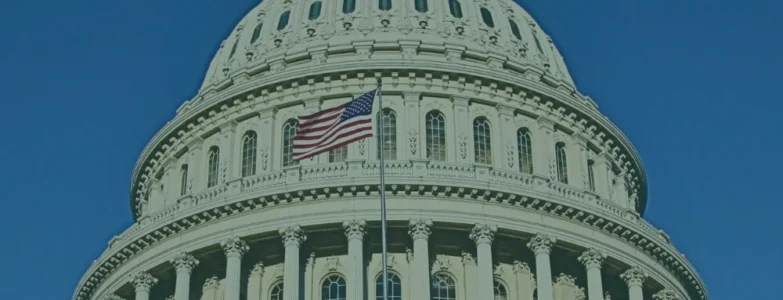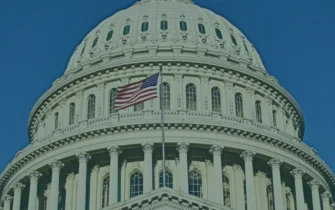As the sun sets on the Tax Cuts and Jobs Act (TCJA), lawmakers in Congress are entering one of the most consequential tax debates in decades. The 2017 law–one that could reshape the financial landscape for individuals and businesses alike–is set to partially expire by December 31, 2025. If Congress fails to act, tax rates for millions of Americans and small businesses will automatically increase.
Now, House Republicans have unveiled a sweeping reconciliation package, branded the “One Big Beautiful Bill Act” proposing to extend or expand key TCJA provisions. In addition, the bill introduces a set of new tax measures aimed at business owners, wage earners, and families—including immediate expensing for R&D, tax exemptions on tips and overtime pay, enhanced family saving incentives, and controversial changes to energy credits and SALT deductions.
TL;DR: A $3.8 trillion tax debate now spans two bills. The House plan leans middle-class and entrepreneurial, while the Senate version (released on June 17, 2025) boosts corporations and seniors, limits SALT relief, and modifies Trump’s promise on tips/overtime with income caps. Either way, your tax future is on the line–especially for business owners, high earners, and legacy planners.
What is In the 2025 TCJA Extension Package?
What lawmakers proposed in the House-passed reconciliation bill on May 22, 2025– Top Provisions:
| PROVISION | PROPOSED STATUS | IF TCJA EXPIRES |
| Individual Tax Cuts | Permanent Extension | Top rate rises from 37% to 39.6% |
| Standard Deduction | Made permanent and increased by $1,000–$2,000 through 2028 | Returns to ~$6,500 (2017 levels) |
| Child Tax Credit | $2,500 through 2025, then $2,000 with inflation indexing | Drops to $1,000 |
| Section 199A (Pass-Through) | Permanent & increased to 23% | Repealed in 2026 |
| Estate & Gift Tax Exemption | Permanently set at $15 million per person | Falls to ~$6 million |
| SALT Deduction Cap | Raised to $40,000 for joint filers under $500K | Stays capped at $10,000 |
| Overtime & Tips | Income from both becomes tax-exempt | Remains fully taxable |
Sources: Joint Committee on Taxation, Kiplinger, Forbes, Congress.gov, AOL News
What Happens if Congress Doesn’t Act and the TCJA Extensions don’t occur?
If lawmakers fail to pass an extension, the result is an automatic tax increase on January 1, 2026. Beyond higher tax rates, additional provisions would kick in—directly affecting business owners, high earners, and families.
- Individual tax rates revert to 2017 levels–
The TCJA lowered individual tax rates across income brackets, reducing the top marginal rate from 39.6% to 37%. Without an extension, rates will revert to pre-TCJA levels. House Republicans aim to make these lower rates permanent, a move that would benefit high-income households the most.
- The child tax credit would be halved, affecting middle-class families disproportionately.
- Estate and gift exemptions fall by 50%, triggering urgency in legacy and wealth planning.
- Without the 199A deduction, pass-through businesses would lose their 20% QBI deduction—
Perhaps the most significant change for small business owners, Section 199A allows a 20% deduction on qualified business income (QBI) for certain pass-through entities, such as sole proprietors, S-corporations, and partnerships. Without an extension, this provision disappears in 2026. The GOP bill seeks to make it permanent, citing its role in supporting entrepreneurship and small business growth.
- Standard Deduction vs. Personal Exemptions The TCJA nearly doubled the standard deduction—now $13,850 for individuals and $27,700 for joint filers in 2024—but eliminated personal exemptions. The proposed extension would preserve this setup. If not renewed, millions may face a more complex filing process and potentially higher tax liabilities.
According to the Congressional Budget Office, expiration could raise $3 trillion in federal revenue over the next decade—but at the cost of smaller paychecks and higher compliance burdens.
What Is New in the Bill Beyond TCJA Extensions?
While most media attention centers on TCJA extensions, the bill also sneaks in new tax policies:
- Overtime Pay and Tips: Income from both becomes income-tax-free, fulfilling a 2017 Trump campaign promise. This measure primarily benefits hourly wage workers, restaurant staff, and service employees whose earnings rely heavily on variable compensation.
- Auto Loan Interest Deduction: A new write-off for interest paid on car loans, capped annually. The deduction is expected to ease financial pressure on middle-income earners who depend on vehicle financing.
- Retirement Incentives: Higher HSA contributions and increased standard deduction for retirees aged 67 and older.
- “Trump Account” Savings Plans: Similar to Roth IRAs, but with fewer restrictions and higher limits.
- Clean Energy Credit Phase-outs: Accelerated elimination of certain solar and EV credits. This rollback could significantly affect high-income households and businesses invested in clean energy adoption or renewable infrastructure.
While the House has already passed a bold extension bill on May 22, 2025, the Senate released on June 17, a competing version that diverges in critical ways, particularly around corporate tax breaks, SALT caps, and benefits for older Americans.
Senate Republicans Unveil Competing Plan on June 17, 2025: Key Tweaks and Divergences
Two weeks after the House passed its sweeping tax bill, Senate Republicans released their own version–similar in intent but distinct in several critical ways. While both chambers seek to extend TCJA’s expiring provisions, the Senate measure goes further in favoring corportions and older Americans, while pulling back on certain controversial House ideas.
Key Senate Adjustments [from June 17, 2025] Include:
| PROVISION | PROPOSED BY SENATE ON JUNE 17 2025 | HOUSE-PASSED VERSION (MAY 22, 2025) |
| Standard Deduction Boost | Senate plan offers a one-time $1,000-$2,000 increase strating in 2026 and then locks it in permanently. | The House version applies the boost only through 2028. |
| Child Tax Credit | Senate proposes a permanent $2,200 credit starting in 2025, lower than the House version. | The House bill proposed a temporary $2,500 credit through 2028. |
| Section 199A (Pass-Through Deduction) | Senate proposes making the 20% pass-through deduction permanent–lower than the 23% suggested in the House bill, but notable for permanence. | The House bill proposed a permanent-higher pass-through deduction of 23% |
| Tips & Overtime Income | Senate caps deductions for tips and overtime and introduces income-based phaseouts (starts at $150,000 for individuals) | The House bill offers uncapped deductions but with sharp cutoff cliffs. |
| Omissions | Senate drops the House’s proposed surtax on college endowments and the limits on sports franchise deductions | The House bill includes a proposed surtax on large private college endowments–set at 21%- and limits deductions for professional sports franchises |
| SALT Deduction Cap | Senate leaves the $10,000 cap unchanged. | The House bill raises it to $40,000 for joint filers under $500K income–a major flashpoint. |
| Auto Loan Interest Deduction | Senate narrows this to only new cars made in the U.S., aligning with a proposal from Senator Bernie Moreno of Ohio. | The House bill proposes a new annual deduction for interest paid on auto loans, capped at $10,000, with no restriction on vehicle type, manufacturer, or origin (i.e. new or used, domestic or foreign). |
What Should Business Owners and CPAs Do Right Now?
Action Checklist for 2025:
- Start Projections Early: Run tax liability scenarios for 2026 and beyond—both with and without TCJA extensions—to assess exposure.
- Reevaluate Entity Type: The 199A deduction may vanish. For some businesses, converting an LLC to a C-Corp might become more advantageous.
- Prepare for Estate Planning Rush: If the estate tax exemption drops by half, expect a wave of last-minute wealth transfers in late 2025.
- Monitor State-Level Trends: States often conform to federal tax rules. Keep an eye on whether state legislatures adjust their codes in response to TCJA sunsets.
This is more than a spreadsheet problem. The fight over the TCJA extensions is a defining referendum on:
- What “fairness” means in tax policy
- Who deserves tax relief—and at what cost
- How to balance growth, inequality, and fiscal sanity
Whether you’re a CPA, CEO, freelancer, or family of four—this isn’t just tax reform. It’s a reset button for the next generation of American economic identity—making it essential for business owners, high-income earners, and wage workers alike to understand the implications of potential TCJA changes.
Political Outlook: The Byrd Rule and Budget Jenga
To pass the bill with a simple Senate majority, Republicans are leveraging the budget reconciliation process, which allows certain legislation to bypass the 60-vote filibuster threshold. But there’s a catch: under the Byrd Rule, every provision must directly impact the federal budget and cannot increase the deficit beyond a 10-year window.
That constraint creates a high-stakes legislative game of Jenga–where provisions like the $40,000 SALT cap for joint filers, new “Trump Account” savings plans, or auto loan interest deductions may be stripped out by Senate parliamentarians unless they’re paired with credible offsets or scored as deficit-neutral
In this context, the Senate’s proposed tweaks heighten reconciliation risks. For example, capped and phased-out deductions for overtime and tips may be easier to justify under Byrd Rule constraints than the House’s broader, cliff-based deductions. However, Senate refusals to raise the SALT cap could doom compromise efforts in the House, where lawmakers from high-tax states have already warned that any final bill keeping the $10K cap is “dead on arrival.” 1
TCJA Extensions 2025: Who’s Watching?
- Senate Budget Committee staff and parliamentarians are actively reviewing the House bill line-by-line this month to determine what survives reconciliation.
- Fiscal conservatives in both chambers are demanding deeper spending cuts or “sunsets” to counter the $3.8 trillion cost over 10 years.
- Democrats, meanwhile, have signaled discomfort with extending high-income tax cuts unless paired with middle-class relief.
Timeline
- Senate leaders have set an informal target of passing the bill before the July 4 recess, according to multiple sources including CBS News.
- Text revisions and technical amendments are expected to be finalized by mid-June, per reporting from the Rhodium Group, as committees work to vet revenue impacts and parliamentary compliance.
- [NEW] June 17, 2025: Senate Republicans officially unveiled their competing tax package, proposing key differences from the House bill–including capped tip and overtime deductions, a smaller child tax credit, and no SALT cap increase–setting up a potential showdown over reconciliation.
- If a Senate vote slips past July, the next realistic window may not be until after Labor Day—a politically precarious timeline given the upcoming 2026 budget cycle and November midterms.
So yes—summer negotiations aren’t just tense; they’re deadline-driven and highly contested across party lines and institutional layers. Any Senate changes must return to the House for approval, risking delays. With Republicans holding only a narrow majority, even one defection could derail the bill—complicating consensus and clouding the legislative timeline.
Updated on June 17, 2025 to add the Senate Republicans version.
This article is for informational purposes only and does not constitute tax or legal advice. For personalized guidance, consult a certified public accountant or tax professional.
About Our Firm
At Guillen Pujol CPAs, our Miami firm specializes in high-income tax planning, international tax services, tax management, capital gains tax on foreign-owned property (FIRPTA), outsourced bookkeeping and controller services, among other accounting and tax advisory solutions. Our team of experienced tax professionals has helped thousands of clients navigate complex regulations. This includes areas like corporate maintenance and compliance, tax compliance and optimal tax management strategies, business financial performance evaluation, and compilation services. As leading experts among Miami CPA firms, we are committed to providing exceptional business and tax consulting services tailored to your needs.
Take Action Now: Need professional tax guidance? Contact us today.
Planning Tomorrow, Together, with GPCPAs.
Trusted by Businesses Worldwide
Editor’s Note: This post is part of the ‘GPCPAs Info Hub,’ an initiative dedicated to empowering you with the knowledge and strategies needed to navigate the complexities of the U.S. tax system and financial strategies. Visit our Information Hub, a curated resource offering the latest in tax, economic, and business news, alongside actionable guidance on tax strategies, accounting, and business advisory—because Planning Tomorrow starts here.
- “Those divisions emerged before the Senate could even release the text of its tax package. Representative Mike Lawler, Republican of New York, posted on social media that any Senate measure that renewed the $10,000 SALT cap would be ‘DEAD ON ARRIVAL’ in the House.”
From The New York Times article , written by Reporter Tony Romm, that summarizes the Senate Republican tax proposal [June 17, 2025] Tony Romm is a reporter covering economic policy and the Trump administration for The Times, based in Washington. ↩︎











